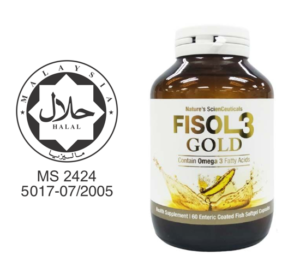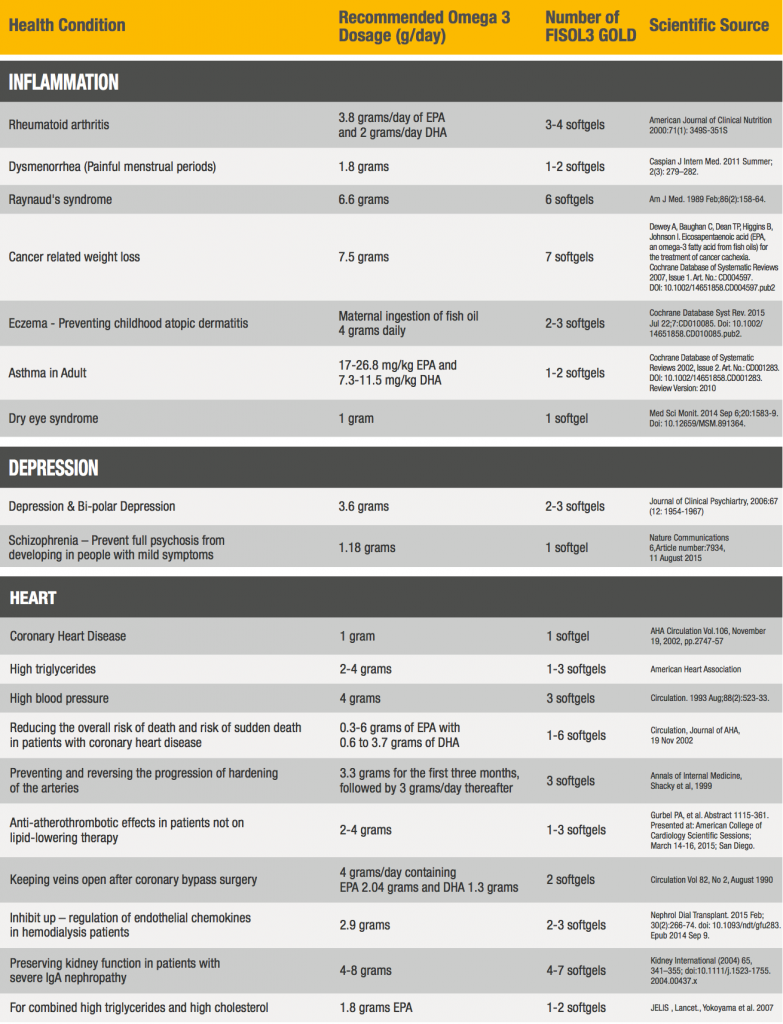
Ultra High Purity EPA (Eicosapentaenoic Acid) Concentrate
FISOL3 GOLD provides the high concentrations of EPA required to produce clinical benefits in a high purity form. With an exceptionally high ratio of EPA to DHA, FISOL3 GOLD specifically targets heart health, eicosanoid-related mood and inflammatory conditions.
The omega 3 long chain polyunsaturated fatty acids EPA and DHA (docosahexaenoic acid) are both vital for good health, however, recent research indicates that they have distinct functions in the body. Some conditions, therefore, may be treated more effectively with EPA than DHA and vice versa. EPA is essential for heart health and the regulation of brain functioning, such as cell signalling and neuronal blood flow. It also plays an important role in controlling the inflammatory and immune systems.
Dosing Considerations for Fish Oil:

FISOL3 GOLD Benefits

High potency EPA concentrate (70% min)

Industry-leading purity profile

Halal approved

Smaller and fewer capsules per EPA dose

Condition-specific performance

PhEur and GOED monograph compliant
Key Target Conditions

Heart health

Emotional wellbeing

Inflammatory and autoimmune conditions

Joint health
FISOL3 GOLD offers far higher EPA doses than standard oils, allowing the production of smaller and fewer capsules while maintaining a superior EPA concentration. The proprietary PureMax purification process selectively concentrates the key fatty acid active, EPA, while removing undesirable saturated and shorter chain fatty acids and impurities. FISOL3 GOLD therefore promotes excellent purity levels and greater health benefits.
What Makes FISOL3 GOLD ?

Industry-leading Purity
Every step in the manufacture of the FISOL3 GOLD, from the ocean to the final product, has a focus on purity. Levels of contaminants such as oxidative impurities, heavy metals, dioxins, PCBs and dioxin-like PCBs are minimised using the advanced PureMax™ and Super Refined™ purification technologies, ensuring that the purity levels of the FISOL3 GOLD conform to, and in many cases are superior to, legislative and industry standards.

Heart Health
Dietary supplementation with omega 3 fatty acids may prevent the onset of cardiovascular disease (CVD) and help in the treatment of heart disease. Omega 3 PUFAs are believed to reduce mortality from myocardial infarction by stabilising electrical conductance in the heart muscle, thereby inhibiting arrhythmia and ventricular fibrillations. In a clinical study involving 11,324 patients who survived myocardial infarction by more than 3 months, dietary supplementation with EPA and DHA ethyl esters (ca. 2:1 mole ratio) led to statistically significant reductions in rates of death, non-fatal myocardial infarctions and stroke. Key CVD risk factors include hyperlipidemia, particularly hypertriglyceridemia. Higher blood serum lipid levels are linked to an increased risk of atherosclerosis and heart disease. Omega 3 fatty acids are known to improve plasma lipid profiles by significantly lowering blood triglyceride levels and free fatty acids. Additionally, the balance between low-density lipoprotein (LDL) and high-density lipoprotein (HDL) cholesterol may be improved by dietary intake of EPA. EPA also imparts anti-thrombotic effects, increasing bleeding time and lowering the risk of blood clotting. Other positive effects of dietary omega 3 PUFAs implicated in the treatment of CVD include a decrease in vascular inflammation, blood viscosity and hypertension. FISOL3 GOLD is rich in EPA (min 70%), known to have recognised anti-inflammatory actions. Enjoy a healthy heart with the cardiovascular benefits that FISOL3 GOLD offers.

Emotional Wellbeing
Omega 3 lipids are primary building blocks for the brain and are vital for brain health from before birth and throughout life. Omega 3s are mediators of brain biochemistry and influence the function of neurotransmitters such as serotonin, the chemical involved in regulation of emotions, anxiety, sleep and stress hormones. Low omega 3 levels are risk factors for many neurological and mental disorders including depression and schizophrenia. Increased consumption of fish, rich in omega 3s, is correlated with lower rates and reduced clinical symptoms of depression. Double-blind trials in clinically depressed patients have shown that supplementation with 1g-2g/day 95% EPA gave significant improvements in core depressive symptoms and insomnia. Supplementation with high doses of EPA-rich fish oil over a four month period has been shown to provide substantial clinical improvements in patients suffering from manic depression. In particular, highly significant differences in relapse rates compared with unsupplemented patients were observed.

Inflammatory and Autoimmune Conditions
It is well-known that dietary imbalances between omega 3 and omega 6 fatty acids can significantly influence metabolic functions, and potentially lead to chronic health problems. The omega 6 EFA (essential fatty acid) linoleic acid is enzymatically converted to arachidonic acid (AA), the precursor to a number of pro-inflammatory eicosanoids. EPA can suppress the production of AA-derived pro-inflammatory mediators by competitive inhibition at the cyclooxygenase / lipoxygenase level (see figure 1). It is preferentially metabolised to form anti-inflammatory eicosanoids and down-regulates the synthesis of pro-inflammatory cytokines. Thus EPA moderates inflammatory and immune responses.
EPA, with its anti-inflammatory activity, is indicated in the treatment of many inflammatory and autoimmune diseases such as rheumatoid arthritis, psoriasis, asthma and Crohn’s disease. Unlike some other non-steroidal anti-inflammatory drugs, EPA does not adversely affect cyclooxygenase-1, an enzyme which maintains gastric mucosa and helps protect against gastrointestinal bleeding and gastric ulceration.


Joint Health
Rheumatoid arthritis is an autoimmune disease that affects approximately 1% of the world’s population. It is characterised by inflammation of peripheral joints. The body’s immune defenses attack joint tissues, leading to pain and degeneration of tissue structures. It can significantly reduce quality of life, cause invalidity and decrease life expectancy. Currently there is no cure for rheumatoid arthritis and only symptomatic treatment is available. Research has shown that omega 3s, EPA in particular, can aid dietary management of mild to moderate rheumatoid arthritis, reducing pain and joint stiffness. Clinical trials have demonstrated that EPA supplementation can also moderate the requirement for conventional drugs. Since relatively high levels of EPA are needed to obtain clinical benefits, high potency EPA concentrates such as Incromega E7010 offer particular consumer benefits. Osteoarthritis is a degenerative joint disease involving the breakdown of joint articular cartilage, triggering pain, stiffness and swelling. Scientific research has indicated that omega 3 fatty acids can relieve the inflammatory symptoms of the disease, and may also slow down cartilage degeneration, switching off the collagen-degrading enzymes that break down joint cartilage.
References
- Dietary supplementation with n-3 fatty polyunsaturated fatty acids and vitamin E after myocardial infarction: results of the GISSI-Prevenzione trial, The Lancet, Saturday 7 August 1999, 354 (9177) 447-455
- Simopoulos AP, Omega-3 fatty acids in health and disease and growth and development, Am J Clin Nutr 1991, 54, 438-63
- J R Hibbeln, Fish consumption and major depression, Lancet, 1998, 351, 1213
- M Maes et al, Fish consumption in major depression: decreased omega-3 fractions in cholesteryl esters and increased omega-6/omega-3 ratio, J Affective Disorders, 1996, 38, 35-46
- A Tanskanen et al, Fish consumption and depressive symptoms in the general population, Psychiatric Services, 2001, 52(4), 529-31
- R Edwards et al, Omega-3 polyunsaturated fatty acid levels in the diet and in red blood cell membranes of depressed patients, J Affective Disorders, 1998,48, 149-155
- M Peet and DF Horrobin, A dose-ranging study of the effects of ethyl-eicosapentaenoate in patients with ongoing depression despite apparently adequate treatment with standard drugs, Archives of General Psychiatry, 2002, 59(10) 913-9
- B Nemets, Z Stahl, RH Belmaker, Addition of omega-3 fatty acid to maintenance medication treatment for recurrent unipolar depressive disorder, Am J of Psychiatry, 2002, 159(3) 477-9
- A Stoll et al, Omega-3 fatty acids and bipolar disorders: a review, Prostaglandins, Leukotrienes and Essential Fatty Acids, 1999, 60:329-337
- C L Curtis, C E Hughes, C R Flannery, n-3 fatty acids specifically modulate catabolic factors involved in articular cartilage damage, J Biol Chem, 2000, 275, 721-724
- PUFA Newsletter, Mar 2000, 4 (1) 1-9
- AK Gupta et al, Double blind, placebo-controlled study to evaluate the efficacy of fish oil and low-dose UVB in the treatment of psoriasis, Brit J Dermatol, 1989, 120, 801-807
- Epidemiology: Osteo and Rheumatoid Arthritis – Defining the patient populations, Datamonitor, Oct 2003
- DL Scott et al, Long-term outcome of treating rheumatoid arthritis: results after 20 years, Lancet, 1987, 1, 1108-1111
- PR Fortin et al, The effects of fish oil in rheumatoid arthritis patients; validation of a meta-analysis, J Clin Epidemiol, 1995, 48, 1379-1390
- JJ Belch and A Muir, n-6 and n-3 Essential fatty acids in rheumatoid arthritis and other rheumatic conditions, Proceedings of the Nutrition Society, 1998, 57, 563-569
Disclaimer
This document makes reference to scientific research into the benefits of omega 3s.
This document is not intended to provide diagnosis, treatment or medical advice. Products, services, information and other content provided in this document, including information that may be provided on this document directly or by linking to third-party references are provided for informational purposes only. Please consult with a physician or other healthcare professional regarding any medical or health related diagnosis or treatment options.
